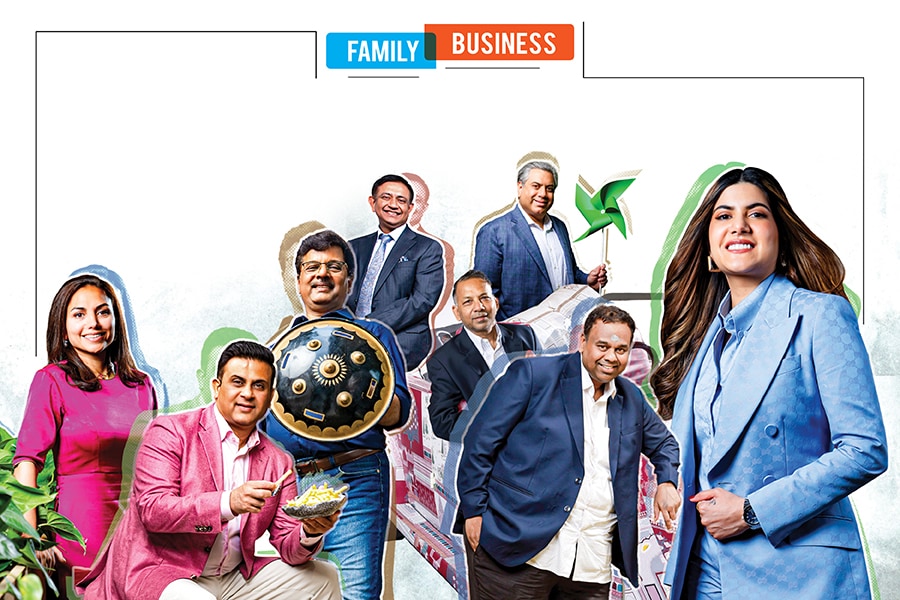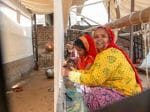Family Business Special: How the next-gen is striking a balance between family and business
From Birla, Godrej, and Hero to Paramount, Quick Heal, HyFun, and Trident, the family businesses in India are undergoing a tectonic shift: From family-run to family-led. The change underlines just one message: From being a work-in-progress (WIP), businesses are now FIP (family-in-progress)
 (Left to right) Nyrika Holkar, executive director, Godrej and Boyce; Haresh Karamchandani, MD and CEO, HyFun Foods; Kailash Katkar, founder and MD, Quick Heal Technologies; Sandeep Aggarwal, managing director, Paramount Cables; Rajinder Gupta, chairman emeritus, Trident Group; Rahul Munjal, chairman and MD, Hero Future Energies, Naga Srinivas Kacham, MD, Padmaja Herbs and Foods Pvt. Ltd., Ananya Birla, director, Grasim Industries, Hindalco Industries and Aditya Birla Fashion and Retail
(Left to right) Nyrika Holkar, executive director, Godrej and Boyce; Haresh Karamchandani, MD and CEO, HyFun Foods; Kailash Katkar, founder and MD, Quick Heal Technologies; Sandeep Aggarwal, managing director, Paramount Cables; Rajinder Gupta, chairman emeritus, Trident Group; Rahul Munjal, chairman and MD, Hero Future Energies, Naga Srinivas Kacham, MD, Padmaja Herbs and Foods Pvt. Ltd., Ananya Birla, director, Grasim Industries, Hindalco Industries and Aditya Birla Fashion and Retail
The third-generation entrepreneur tells us about the superpower of his family. Unity, resilience, trust, and transparency are unmistakable qualities that a family must possess if it has a generational outlook. “These too are superpowers, but our real superpower is the family,” says Dhruv Aggarwal, president (strategy) of Paramount Communications. The company was started by Aggarwal’s grandfather as a house wire brand in 1955. Close to seven decades later, Paramount Cables—the flagship brand of Paramount Communications—is one of the biggest cable makers in India.
Some 1,500 km from Delhi, Sneha Katkar, tells us about the superpower of her family. “The biggest power is to give up power,” says the second-generation entrepreneur from the Katkar family. Her father, Kailash Katkar, started a calculator and computer repair shop in 1993, which later morphed into an anti-virus brand, and was renamed Quick Heal in 2007. Over 15 years later, the family roped in a CEO from outside. Though professionalisation of family-run businesses is a natural stage of evolution, it’s not easy for the promoters or their kids to yield control. The job, however, becomes easier when the founder is quick to see the writing on the wall, or outside forces make the founder embrace the new reality.
Also read: Indian family businesses: Power of legacy and driving it forward
In the case of Quick Heal, it was both. The founder explains the logic behind the move. “We have done this 0 to 1 journey. And I can do this ‘start from scratch’ again and again,” he says. But for the business to reach the next stage, it needs a different set of skills and vision. “Professionals, along with the next-gen, are best equipped for the ‘1 to 10’ journey,” he says, adding that he was also fed up with the perception of the company being a ‘promoter-run family’. While he roped in an outsider, he allowed the second gen to learn the ropes. Kailash’s daughter started with the B2B side of the business and now takes care of the consumer product portfolio of Quick Heal. The next-gen, underlines the patriarch, has the firepower, passion, and vision to drive the company ahead.
As one moves from Pune to Ahmedabad, one gets to witness another aspect of a ‘superpower’: The next-gen completely transforming the traditional family-run business. This is what Haresh Karamchandani did. Coming from a family that started a trading business in potatoes and onions in 1962, the third-gen entrepreneur started HyFun in 2015, and the family made a transition from trading to manufacturing. Today, HyFun is India’s biggest exporter of frozen french fries, and frozen potato products. Around 70 percent of sales are through exports to over 40 countries and it counts Burger King, KFC Mother Dairy, ITC, Godrej, and Wal-Mart India among its long list of customers.
Haresh’s father acknowledges the pivotal transformation. “I am incredibly proud of my son in building HyFun Foods into a global brand,” says Jayraj Karamchandani, director of HyFun Foods. “His foresight in exporting fries has been a game-changer for our business,” he adds.
In this special issue on family businesses, Forbes India handpicked a mix of known and not-so-known names to highlight how the next-gen along with professionals are changing the nature of the family, and business, for the better. From Birla, Godrej, and Hero to Paramount, Quick Heal, HyFun, and Trident, the family businesses in India are undergoing a tectonic shift: From family-run to family-led. The change underlines just one message: From being a work-in-progress (WIP), businesses are now FIP (family-in-progress).


















